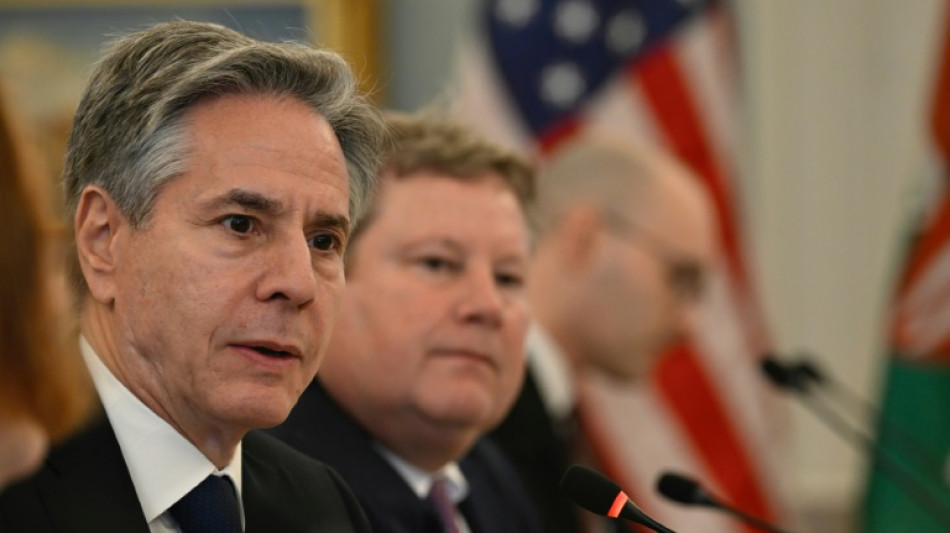
RBGPF
0.0000

US Secretary of State Antony Blinken arrived in Saudi Arabia on Monday for another Middle East crisis tour, hoping to secure a new truce in the Israel-Hamas war as Gaza saw no let-up in fighting.
On his fifth trip to the region since Hamas's October 7 attack that triggered the war, Blinken landed in Riyadh and was later expected to visit Israel, Egypt and Qatar.
Ahead of the trip he stressed the need for "urgently addressing humanitarian needs in Gaza", after aid groups have repeatedly sounded the alarm over the devastating impact nearly four months of war have had on the besieged territory.
"The situation is indescribable," said Said Hamouda, a Palestinian who fled his home in the Gaza Strip to the southern city of Rafah on the border with Egypt.
Over the weekend, Israel pressed further south towards the densely-crowded border city, warning that its ground forces could advance on Rafah as part of the campaign to eradicate Hamas.
On Monday morning, sources told AFP they could hear artillery shelling in the areas of eastern Rafah and Khan Yunis, where Israel believes high-ranking Hamas officials are hiding.
At least 128 people, mostly women and children, were killed in Israeli strikes overnight to Monday, according to the health ministry in the Hamas-ruled territory.
The Hamas government media office said Israeli bombardment had continued across the centre and south of the coastal Strip, including near hospitals.
The Israeli military said troops operating in the northern and central Gaza Strip had "killed dozens of terrorists," and were engaging with Hamas militants in the Khan Yunis area.
Hamas's armed wing said its militants attacked Israeli troops southwest of Gaza City.
- No agreement yet -
Blinken is expected to discuss a proposed truce thrashed out in a Paris meeting in January of top US, Israeli, Egyptian and Qatari officials.
The diplomatic push has become more urgent with a surge in attacks across the region by Iran-backed groups in solidarity with Hamas, triggering counterattacks by the United States.
The proposed truce would pause fighting for an initial six weeks as Hamas frees hostages in exchange for Palestinian prisoners held by Israel, according to a Hamas source.
Hamas has said no agreement has yet been reached, while some Israeli officials have expressed opposition to any perceived concessions.
The war was sparked by Hamas's unprecedented October 7 attack on Israel, which resulted in the deaths of about 1,160 people, mostly civilians, according to an AFP tally based on official figures.
Militants also seized around 250 hostages. Israel says 132 remain in Gaza -- including at least 28 believed to have been killed, according to updated figures from the prime minister's office.
Vowing to eliminate Hamas, Israel launched a massive military offensive that has killed at least 27,478 people in Gaza, mostly women and children, according to the Hamas-ruled territory's health ministry.
Gazans have faced dire humanitarian conditions, and the UN agency for Palestinian refugees, UNRWA, said on social media platform X that "there is very limited access to clean water and sanitation amid relentless bombardment".
UNRWA itself is facing a major controversy after accusations that 12 staff members were involved in Hamas's October 7 attack.
More than a dozen countries, led by the United States, suspended their funding to the agency after the claims surfaced.
On Sunday, EU foreign policy chief Josep Borrell warned that nations suspending funding to UNRWA were threatening the existence of an agency providing "vital aid to more than 1.1 million people in Gaza suffering from catastrophic hunger and the outbreak of diseases".
- Humanitarian crisis -
Before departing for the region, Blinken said the humanitarian crisis would be one of his focuses.
"Urgently addressing humanitarian needs in Gaza and advancing stability in the Middle East are priorities we share with Saudi Arabia," Blinken said he told Saudi foreign minister Faisal bin Farhan.
The Gulf state had been mulling establishing formal relations with Israel before the war.
After talks in January with de facto Saudi ruler Crown Prince Mohammed bin Salman, Blinken said he still saw a "clear interest" in pursuing normalisation.
Blinken's latest Middle East visit comes as Israel's National Security Minister Itamar Ben-Gvir told the Wall Street Journal that its key ally had not shown sufficient support.
"Instead of giving us his full backing, (US President Joe) Biden is busy with giving humanitarian aid and fuel (to Gaza), which goes to Hamas," he said in an article published Sunday.
His outburst followed Washington imposing sanctions on four settlers amid rising violence against Palestinian civilians in the occupied West Bank.
Prime Minister Benjamin Netanyahu hit back at Ben-Gvir, saying: "I don't need help to know how to navigate our relations with the US and the international community, while standing firm on our national interests."
As well as divisions within his cabinet, Netanyahu is also facing public fury over the fate of the remaining hostages.
Hundreds of people rallied Saturday in Tel Aviv to demand early elections.
Since the Gaza war broke out, Israel has also traded almost daily rocket fire with Iran-backed militant group Hezbollah across its northern border with Lebanon and evacuated many towns and communities there.
Foreign Minister Israel Katz said Monday that "time is running out" to reach a diplomatic solution in south Lebanon.
"Israel will act militarily to return the evacuated citizens" to its northern border area if no diplomatic solution is reached to end the violence, Katz told his visiting French counterpart Stephane Sejourne.
burs-jd/fz/
H.El-Din--DT